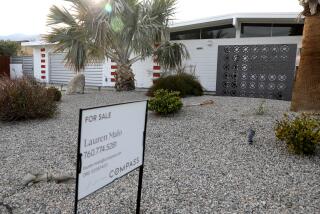For Some Callers, Taped Messages Can Be a Real Hang-Up
- Share via
Jerry Gordon of Beverly Hills asks if I’ve ever thought about the ridiculous messages people leave on their answering machines.
Indeed I have, and I have put some ridiculous messages on my own. The one now in use is “This is Jack and Denny Smith’s. Uh, when you hear the tone please leave your message. Thank you.”
After several attempts at being more conversational and lighthearted, I finally decided that simplicity was the best solution. Gordon says he is tired of messages that say “I can’t come to the phone right now, but if you’ll leave your message . . . “ and so on.
Each of us is trying to deal with this phenomenon in his own way. The answering machine is no longer a novelty. About half the calls I make to private homes are answered by one.
I think what caused me to reduce our message to a minimum was the impatience I felt in listening to the cute messages I was subjected to when I called someone who either wasn’t home or didn’t want to answer the phone. Some of them were excruciating. Some had elaborate apologies for treating the caller in this impersonal way; some were embarrassingly explicit in explaining what was keeping the object of one’s call from answering personally.
Almost all said, “We can’t come to the phone right now,” which obviously is meant to give would-be burglars the impression that someone is home but doesn’t want to answer the phone. To say “We’re not home right now,” it is thought, would bring burglars on the run.
Gordon is especially annoyed by a machine that answers his calls with a 10-second hard rock prelude. That would bother me, too. I’m afraid I’d hang up before the song was over. For that matter, I don’t think I’d stick it out even if the music was by Mozart, or Cole Porter. When you call someone you want him to answer. A plain “hello” will do.
I realize, though, that the answering machine is new to many people and that it takes time to settle on a satisfactory message. To begin with, they are playing with a new toy. They want their answers to be cleverer than their friends’ answers.
Thus, we get: “Hi! This is Joy and Herman Ficus. We’re in the tub right now, but we’ll call you back soon as we’re dry. Meanwhile, don’t take any wooden nickels. Ha! Ha!”
That sort of thing, heard over and over, will sooner or later drive you up the wall.
Gordon argues that most people know enough about answering machines to know that they have to wait for a beep before talking and don’t need to be told. That could be. But I have received messages that were truncated because the caller started talking before the beep.
When you buy your answering machine, it comes with a book of instructions that usually offers a suggested message. The one in mine reads as follows:
“Hello. This is Bob Smith. I can’t come to the phone right now, but if you’ll leave your name, number and a message after the beep, I’ll return your call as soon as I can.”
There are several things wrong with that. As I said, “I can’t come to the phone right now” is unsatisfactory. In the first place, most callers won’t believe it. They’ll think you’re out. Or if they think you’re in, but really can’t come to the phone, they’ll wonder why not. Do you have a broken leg? Are you watching TV? Are you in the bathroom? Are you having sex? Probably they won’t even bother to leave a message.
At least two times out of three your message will fall on the ears of someone who has called to sell you something. He won’t leave a message because he knows you won’t call him back, despite your promise. This means, of course, that your promise was not sincere.
In our computerized society there are too few opportunities for self-expression, and I don’t like to remove one by eliminating creative messages from answering machines.
But would it put too great a damper on the variety of human discourse if we were all to say, simply: “Smith here. Leave a message if you like. Thank you.”
Actually, it isn’t necessary to identify yourself. Assuming the caller has dialed the correct number, he knows who’s there. If he’s dialed the incorrect number, there’s no point in telling him who you are. The “Thank you” is also optional.
But I suppose it doesn’t hurt to waste two words on courtesy.


